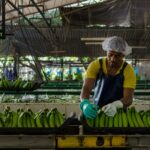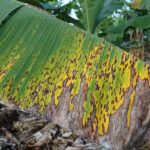Ecuadorian banana industry lifts social responsibility and sustainability

The Association of Ecuadorian Banana Exporters recently hosted the 20th Banana Time Convention in Guayaquil, Ecuador, bringing together all the players in the banana supply chain for a trade show and conference program.
Activities around the convention also showcased the advances the industry has made in social responsibility and sustainability.
Investment in organic production is increasing in the Guayas area which now boasts 3,000 acres of organic banana production. In this region, Fyffes operates a 380-acre San Jorge farm, producing organic Fairtrade bananas and supporting 120 workers. “This area is beneficial for organic produce because it is more arid and less humid,” said Leslie Medina, Fyffe's general manager of banana production.
Fyffes’ banana production system at San Jorge is designed to be sustainable. “For example, 100 percent of our power comes from renewable sources and the large trees on the farm are part of the biological corridor for the Tumbes region,” says Medina. “Bananas are very sustainable. Only 19% of biomass is exported out of the farm. The rest stays on the farm and is composted or recycled.”
In the Machala region, grower Hacienda Nueva Pubenza makes strides to preserve and benefit the environment as well as its community and workers. The farm incorporates sustainable measures throughout its land, preserving native trees and bees and attracting previous rare bird species.
The farm offers nutrition education and adult literacy programs as well as vaccinations for workers and families.
“Up to 70% of the water used for irrigation is recycled,” said Marcel Laniado, manager. “We hope that someday banana production will be married with forestry and beekeeping. This is so important for the sustainability of the land.”
The farm, built by Laniado’s grandfather in the 1950s, employs full-time medical staff for workers and their families.. “We are also very active in nutrition, fluoride, and vaccination programs,” said Laniado. “And, we operate an adult literacy program.”
One of their yields is the Esperanza Hospital. The hospital was an initiative of and is the work of the Catholic Church, through the Diocese of Machala, who sought private companies for support. “Asoagribal and Probanaexpor have collaborated with this social work since 2003, whose benefit is for the entire community, including family members of agricultural workers,” explains Susana Astudillo, administrative director of Hospital Esperanza. "We contribute significantly to the health of the community."
Grower and exporter Jasafrut, also in the Machala area, has a long history of involvement in sustainability and social responsibility programs through its foundation EQUAPAK. The company is a leader in promoting and empowering women and equality in the workforce.
“The farm actively fosters the promotion of women in senior management, provides workshops on self-esteem and psychological counseling, maintains representation of the workforce through an elected worker committee system, and implements various training opportunities on gender equality, discrimination, violence, and safety,” says Paola Cabrera Romero, manager of certifications and security.
In the Los Rios production region, grower-exporter Reybanpac supports its local community through Fundacion Wong, providing education for rural development since 1993. Over the years the Wong School has offered young people and adults access to high-quality learning in their community. Currently, 900 people benefit from the educational programs.
Ricardo Romero, director of the Wong Foundation, explains that in 2011 the Wong school, with Reybanpac and Ecuador’s Ministry of Education implemented a technical production degree for agricultural workers and Wong Foundation graduates gained agricultural skills, thus expanding job opportunities.
“We are evolving to be a technical high school,” he says. “Production plots around the school allow for hands-on learning. Graduates of the program have already seen success with employment and job promotion on farms.”












































